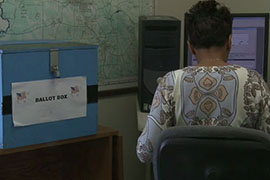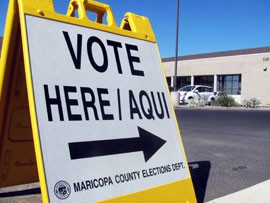Cronkite News has moved to a new home at cronkitenews.azpbs.org. Use this site to search archives from 2011 to May 2015. You can search the new site for current stories.
Thank goodness that’s over: Campaign left voters with ‘election fatigue’
WASHINGTON – Tim Sifert was minding his own business, dropping off campaign mailers at the post office a few weeks back, when he got an earful from a postal clerk who noticed what he was sending.
“The lady commented, ‘Oh, you’re sending campaign mailers. I’m so sick of the ads that the other day I tore up my ballot,’” Sifert said.
She said she regretted ripping up the ballot – Sifert, the Arizona Republican Party’s spokesman told her how to ask for a new one – but her irritation was not uncommon in this just-ended election season.
Buffeted by torrents of negative advertising, flummoxed by the lack of transparency about funding for those ads and generally angry with politicians themselves, that “election fatigue” among voters this year was palpable, experts said.
“I think people are weary of politics in general,” said Robyn Prud’homme-Bauer, president of the League of Women Voters of Arizona.
“People are frustrated, they’re frustrated about the inaction or actions that are not focused on the issues that people think are important,” she said. “Even within our own membership, we’re sensing that frustration.”
Just over a third of registered Arizona voters cast ballots this fall, according to preliminary numbers Wednesday from the Arizona Secretary of State‘s office.
Arizona voters were not alone in their apparent lack of interest.
A Gallup poll released last month suggested American voters’ level of engagement was significantly lower than in midterm elections of 2010 and 2006 and was likely to drive down turnout across the country. Only 32 percent of voters said they were “extremely motivated” to vote in this year’s elections, compared with 50 percent in 2010, according to the poll.
Some of those disenchanted electors in Arizona said this year’s election almost made them want to sit on the sidelines – including stalwarts who said they vote in every election.
“It’s almost like you’re assaulted with the ads,” said Nancie Kent of Gold Canyon a few days before Election Day. “They almost pushed me over the edge to not vote.”
Kent said the ads drove her to stop watching “regular TV” and seek entertainment from Netflix and Amazon Prime instead. She was particularly troubled by the amount of money spent on political advertising.
“It’s not buying my vote,” she said. “It’s encouraging me to tune out, which is what I’ve done.”
Candidates and outside groups were expected to spend close to $3.7 billion to woo voters like Kent in what shaped up as the most expensive midterm elections in U.S. history. Total spending was up slightly from the $3.6 billion spent in 2010, according to the Center for Responsive Politics.
And Arizona saw some of the most expensive congressional races in the country, with much of that spending driven by outside groups.
The nation’s fourth-costliest House election was in southern Arizona, according to the most recent reports from the Federal Election Commission. FEC reports show 2nd District GOP challenger Martha McSally spent at least $2.8 million to unseat Rep. Ron Barber, D-Tucson, who spent nearly $2.6 million on his own.
Outside groups funneled at least $10.7 million into ads and campaign mailers aimed at swaying voters for or against Barber and McSally, who remained locked in a dead heat Wednesday.
The district also saw some of the most negative TV ads this season, including the “stalker gap” ad sponsored by Americans for Responsible Solutions, former Rep. Gabrielle Gifford’s political action committee.
Intended to help Barber – a one-time aide to Giffords – the ad said McSally “opposes making it harder for stalkers to buy a gun.” Giffords’ group took it down after McSally said she had been a stalking victim and had always supported closing the loophole.
Such outside-sponsored ads reached a point of diminishing returns with voters like Jeff Hostetler of Surprise.
He said the “big-money interests, lobbyists and Congress” had soured him on voting in “every election since Citizens United,” the 2010 U.S. Supreme Court decision that removed restrictions on corporate and union campaign contributions.
“Their lips are moving, so they must be lying,” Hostetler said of politicians featured in political ads.
Tempe pollster Mike O’Neil said he heard plenty of complaints this year from voters tired of all the negative political ads. But, he said, “The reason you get them is they work.”
“People in the abstract hate the ads, but they listen to the messages,” O’Neil said.
Arizona Secretary of State Ken Bennett said he, too, sensed many voters were fed up “with the tone and tenor of the ads.”
“My gut tells me there’s even less than the normal enthusiasm when there’s no presidential election on the ballot,” Bennett said the week before the election.
Barbara Lubin, spokeswoman for the Arizona Democratic Party, said it is always a challenge to get voters to the polls “in the non-presidential years.”
“We always worry about it,” she said, but added that it is “not unusual this year.”
Some voters’ lack of enthusiasm may have been partly due to their general feeling of alienation from the political power structure and the corporate interests driving policymakers’ decisions.
“Big Ag, Big Pharma, the Koch brothers, that’s what’s calling the shots,” said David Larson, who lives near Douglas.
“I feel disenfranchised. A lot of people I know feel that way,” he said.
And yet, despite feeling marginalized, Larson said last week he had already voted.
“It’s my sense that it’s sometimes an empty gesture,” he said. “But it’s what we have. It sets us apart from fascist countries.”
Kent and Hostetler also said their sense of civic duty helped them to overcome their negative feelings and cast votes this year.
“I would feel guilty if I didn’t vote,” said Kent.
Hostetler said he planned to vote, too.
“If you don’t vote, then you can’t bitch about it,” he said.
EDITOR’S NOTE: Sources in the Public Insight Network informed the reporting in this story through a partnership with the Cronkite PIN Bureau. To learn more or share your story, click here.









